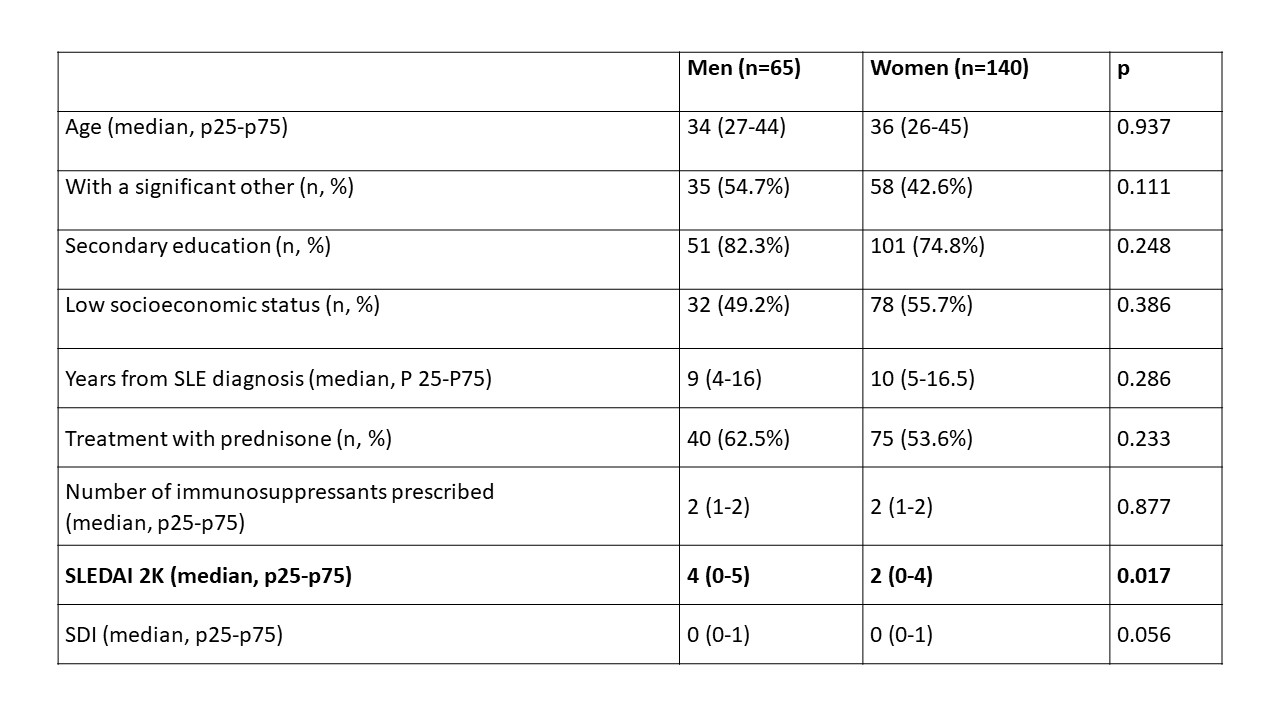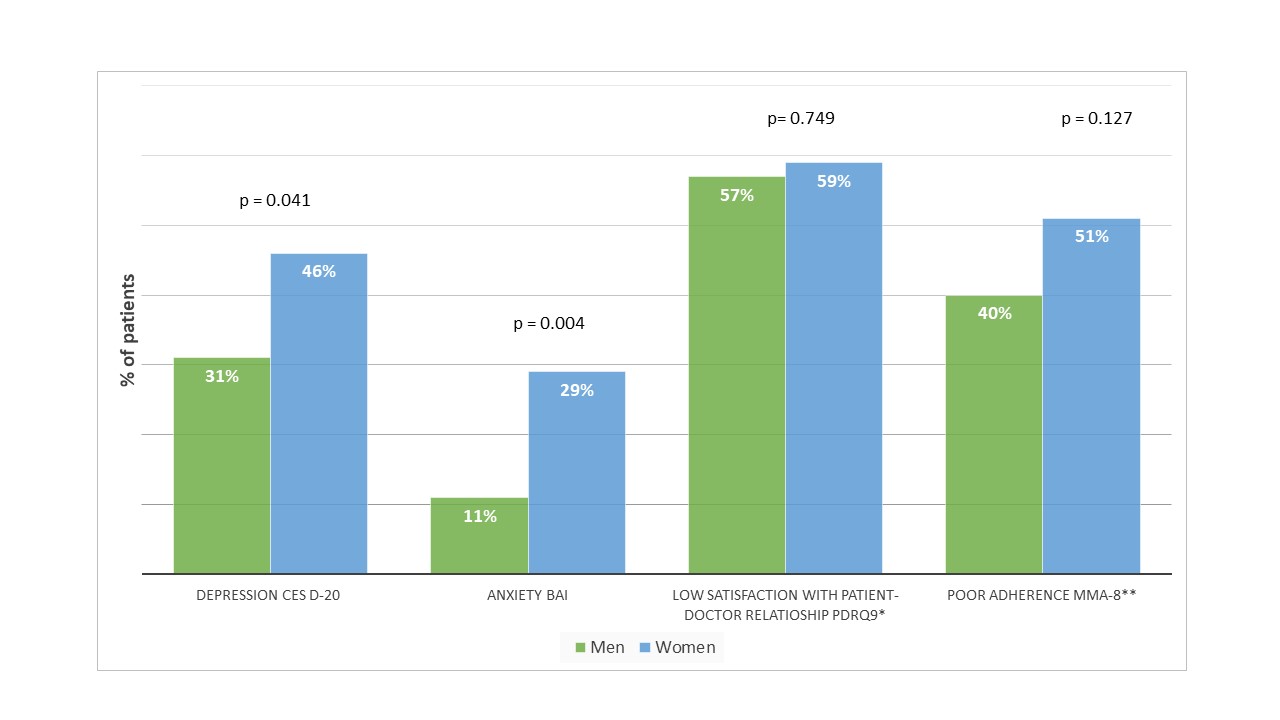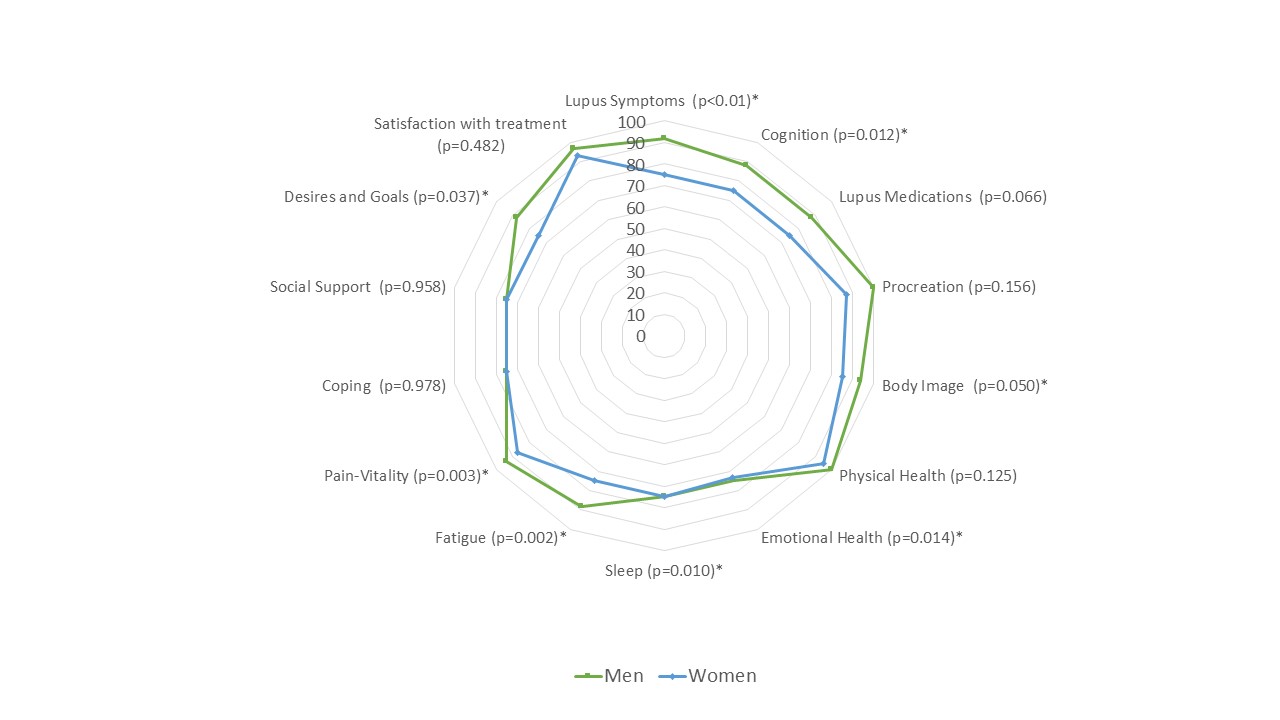Session Information
Date: Sunday, November 8, 2020
Title: SLE – Diagnosis, Manifestations, & Outcomes Poster II: Comorbidities
Session Type: Poster Session C
Session Time: 9:00AM-11:00AM
Background/Purpose: Systemic lupus erythematosus (SLE) predominantly affects young women. It is usually more aggressive in men and carries a worse prognosis. Information about gender differences on psychiatric disorders, quality of life (QoL), patient-doctor relationship and adherence to treatment is limited, as men with SLE are often underrepresented.
Methods: We performed a cross-sectional study in a third-level hospital in Mexico City, from June to December 2019. We included SLE patients who met ACR criteria and recorded demographic and clinical data, including disease activity (SLEDAI 2K) and disease damage (SLICC-DI). We assessed depression (CES D-20) and anxiety (BAI), with tools validated to Spanish language. We also evaluated QoL (LupusPRO), patient-doctor relationship (PDRQ-9) and adherence to treatment (Morisky-8).
Results: A total of 65 men and 140 women with SLE were recruited. There were no differences in demographic and clinical aspects (years from diagnosis, treatment strategies, and damage index), except for disease activity at the time of inclusion; men had higher SLEDAI scores [4(0-5) vs 2 (0-4), p=0.017] (Table 1). Conversely, there was no significant difference between genders in satisfaction with patient-doctor relationship and low adherence to treatment was reported by both groups (Figure 1).
On the other hand, QoL, as measured by LupusPRO, had lower scores in all domains for women, with a global score of 76 (64-83) in women vs 83 (73-88) in men, p=0.003 (Figure 2). Female patients more frequently reported high scores in the depression [46 vs 31%, p=0.042] and anxiety [29 vs 11%, p=0.004] scales than their male counterparts. We found that anxiety had a negative weak correlation with patient-doctor relationship satisfaction (r=-0.179, p=0.010) and adherence to treatment (r=0.266, p< 0.005) in the whole group. Depression also negatively correlated with these two scores (patient-doctor relationship: r=-0.194, p=0.005; and adherence to treatment: r=-0.206, p=0.003).
In the multinomial logistic regression model, we found that women with SLE had a significantly higher prevalence of anxiety, depression or both (OR 2.57, 95%CI 1.36- 4.8, p=0.004).
Conclusion: This is the first study to demonstrate that being female is an independent risk factor for anxiety, depression, or both, in patients with SLE. It also demonstrates that, even though men have higher disease activity, women have lower scores in QoL and often report more SLE-associated symptoms. It is important that rheumatologists take these findings into account, in order to establish optimal support according to gender.
 Table 1. SLEDAI 2K= Systemic Lupus Erythematosus Disease Activity Index 2000, SDI= Systemic Lupus International Collaborating Clinics/American College of Rheumatology Damage Index
Table 1. SLEDAI 2K= Systemic Lupus Erythematosus Disease Activity Index 2000, SDI= Systemic Lupus International Collaborating Clinics/American College of Rheumatology Damage Index
 Figure 1. CES D-20= Center for Epidemiologic Studies Depression Scale, BAI= Beck Anxiety Inventory, PDRQ9= 9-item Patient-Doctor Relationship Questionnaire, MMA-8= 8-item Morisky medication adherence. *Patients that reported scores below the threshold for satisfaction in their patient-doctor relationship. **Patients with poor adherence according to the MMA-8 tool, using < 6 to define poor adherence.
Figure 1. CES D-20= Center for Epidemiologic Studies Depression Scale, BAI= Beck Anxiety Inventory, PDRQ9= 9-item Patient-Doctor Relationship Questionnaire, MMA-8= 8-item Morisky medication adherence. *Patients that reported scores below the threshold for satisfaction in their patient-doctor relationship. **Patients with poor adherence according to the MMA-8 tool, using < 6 to define poor adherence.
 Figure 2: Quality of life spydergram for men and women with systemic lupus erythematosus measured by LupusPRO, * values are statistically significant.
Figure 2: Quality of life spydergram for men and women with systemic lupus erythematosus measured by LupusPRO, * values are statistically significant.
To cite this abstract in AMA style:
Cano-Cruz L, Aguirre-Aguilar E, Valdez-López M, Barrera-Vargas A, Pascual Ramos V, Merayo-Chalico J. Sex Differences in Mental Health and Quality of Life and Their Impact in the Treatment of Patients with Systemic Lupus Erythematosus [abstract]. Arthritis Rheumatol. 2020; 72 (suppl 10). https://acrabstracts.org/abstract/sex-differences-in-mental-health-and-quality-of-life-and-their-impact-in-the-treatment-of-patients-with-systemic-lupus-erythematosus/. Accessed .« Back to ACR Convergence 2020
ACR Meeting Abstracts - https://acrabstracts.org/abstract/sex-differences-in-mental-health-and-quality-of-life-and-their-impact-in-the-treatment-of-patients-with-systemic-lupus-erythematosus/
